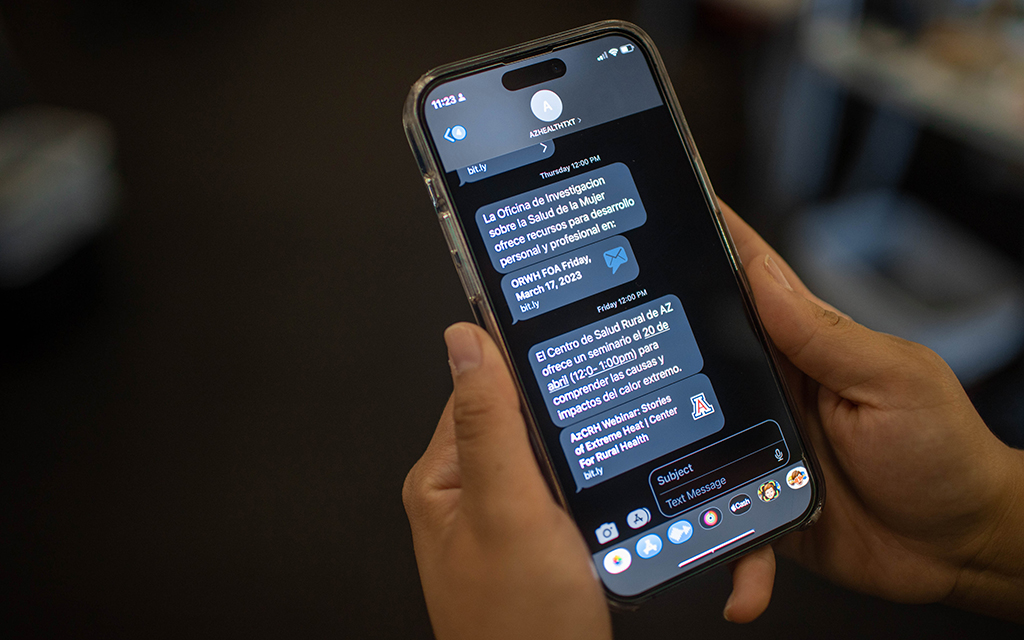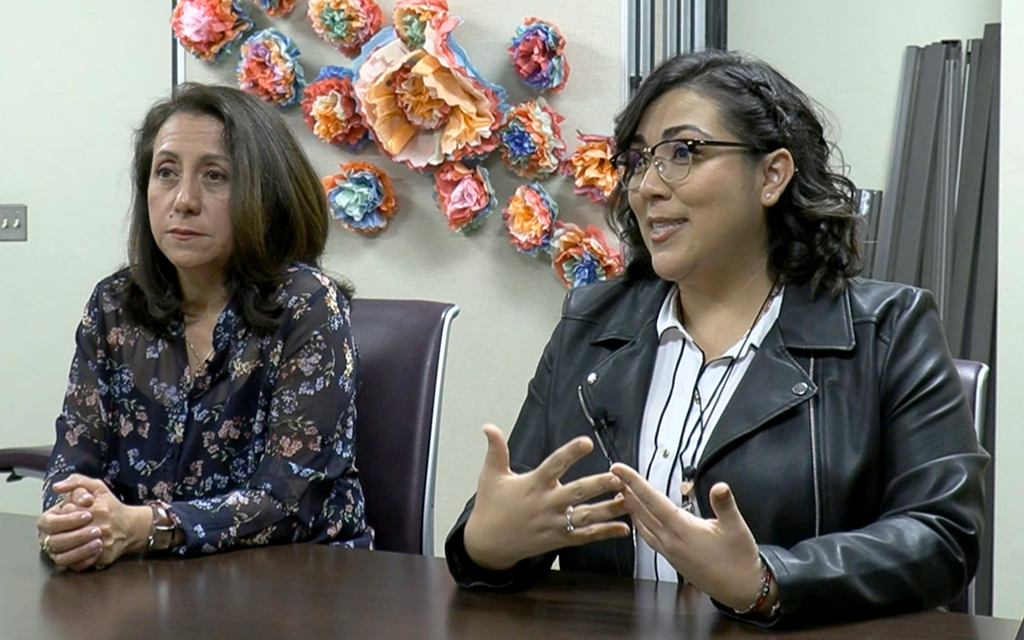
The Center for Rural Health sends texts in English and Spanish, aimed at rural residents, to people who sign up for the service. A text in Spanish says the Office of Research on Women’s Health offers personal and professional development resources, while the second text says that the center is hosting a seminar on April 20 to educate people on the causes and impact of extreme heat. (Photo illustration by Drake Presto/Cronkite News)
PHOENIX – Text messages updating rural residents about COVID-19 are now being expanded to other health issues to text people who have less access to health care, including people of color, migrants and those who are immunocompromised.
The platform was built to provide up-to-date information to rural health care providers on COVID-19 protocols during the early days of the pandemic. The Center for Rural Health at the University of Arizona sent texts to over 3,000 subscribers during the pandemic, according to Maiya Block Ngaybe, who coordinates outreach for the program. But as the number of cases caused by the coronavirus continues to drop, the need has evolved.
In the three years it has been available, the platform has been updated to provide information, such as mental health best practices, healthy aging tips and updates on the newest strains of COVID-19 to the general public and medical workers. Subscribers can utilize the two-way texting feature to update their preferences and give more information on their household’s health.
“At the time it was very challenging for people in rural Arizona to stay up to date on what the evolving guidelines and protocols were,” Ngaybe said. “Azcovidtxt allows for people to have short and quick updates about the emerging guidelines, in a very concise manner, from a trusted source of information.”
The program, based at UArizona’s Mel and Enid Zuckerman College of Public Health in Tucson, built the platform and system with funding from the Centers for Disease Control and Prevention.
“Rural Americans are more likely to die from heart disease, cancer, unintentional injury, chronic lower respiratory disease, and stroke than their urban counterparts,” according to the CDC.
Rural residents often live in “medical deserts,” having to travel further than city residents to hospitals, medical clinics and specialists, according to the Rural Health Information Hub.
Timeliness, reliability, and accessibility are a primary focus for the team behind the system.
“Texting has been identified as being a feasible way of reaching these rural communities where there is often a lack of cell phone and internet connection,” according to Ngaybe. “This is one way that we might be able to reach them a little bit more efficiently.”
She explained how it works: Residents learn about the text program, usually from community organizations such as local churches, community centers or events. People sign up by texting “join” to 1-833-410-0546, then are asked to fill out information such as their ZIP code, employment status and whether they are health care workers, essential or nonessential workers. Users are also asked if they prefer to get texts in English or Spanish, what preexisting conditions they may have and “what information are you having challenges accessing this week?”
The platform’s staff, who include public health and computer science students at UArizona, curates a stream of current health-related news articles, reports and updates tailored to the user’s needs and location.
Subscribers received a text on April 7 providing information on an upcoming seminar about the impacts of extreme heat.
The COVID-19 program is being renamed azhealthtxt, officials told other health providers at a spring conference of public health officials in Phoenix. The UArizona group was among several new programs, funded by a $2.25 billion grant from the CDC, aimed at closing health-care gaps in the U.S.
Public health officials from Arizona’s 15 counties gathered in Phoenix at the annual conference share best practices on tackling disparities, according to Will Humble, the executive director of the Arizona Public Health Association.
“We thought it would be a good idea to have a conference where we invite all the counties to present their work under that CDC disparities grant so they can learn what each other are doing and best practices,” he said. “They can then take that information they learned and maybe change their plans for next year or include other things.”
The health association’s annual conferences center on the most relevant topics in the medical field. Previous conferences have focused on topics such as mental health and the opioid crisis.
This year, the association conference focused on health care disparities in historically high-risk and underserved people such as LGBTQ+ individuals, rural residents and those who are homeless.



